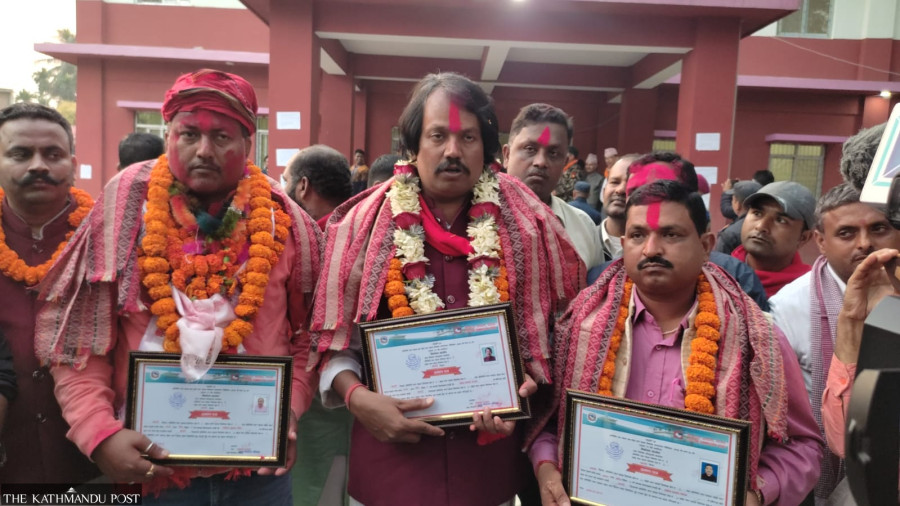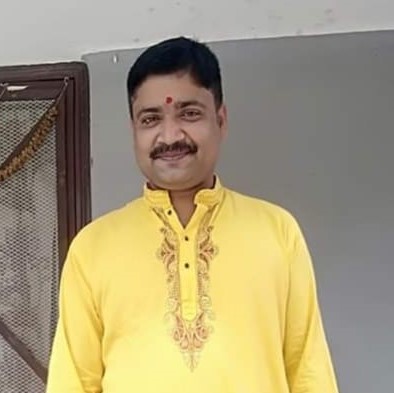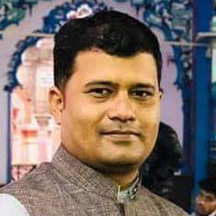Politics
CK Raut’s Janamat Party emerges as a strong regional force
His victory surprised many as his party’s performance during the May local elections had been dismal.
Abdhesh Kumar Jha & Santosh Singh
The announcement of Chandra Kanta (CK) Raut, chairman of Janamat Party, to contest the federal election from Saptari Constituency-2 months before the November 20 elections had created ripples in Madheshi politics. Janata Samajbadi Party chief Upendra Yadav had been elected to the House of Representatives from the same constituency with a huge margin in 2017.
Saptari-2 thus became an obvious battleground for the two leaders after Yadav, who rose to prominence after the success of the 2006 Madhesh movement, and Raut, who entered into mainstream politics renouncing his secessionist campaign, locked their horns in the federal polls.
Yadav had been popular among Madheshi people for raising the issues and agendas of Madhesh and the Madheshi community while people have accused the JSP of sitting on their hands even when the party was in the federal government since 2017 and is leading the provincial government. JSP left the government a few months ago when the general and provincial elections were announced.
On the other hand, the Janamat Party portrayed itself as a strong opposition force with its roots on the streets with the common people. The Raut-led party criticised the Madhesh government for its drawbacks, and irregularities and constantly raised issues concerning the livelihood of common people.
During the campaign, JSP leaders and activists mocked the Janamat Party and ridiculed its election symbol, loudspeaker, calling it a whistle—a watered-down version of its strength. But the ‘whistle’ has made the JSP restless with Raut's party winning both the provincial seats and Raut’s victory with a huge margin in Saptari-2.
During his election campaign, Raut expressed his commitment to controlling corruption and creating job opportunities and voters endorsed his agendas. Raut’s victory went against predictions in light of its dismal performance during the May local elections.
The groups who extended major support to Janamat Party are mainly the youths, members of the Dalit communities and those from economically poor backgrounds.
“People give opportunities and choose alternatives in democracy. Raut’s victory gives a clear message that people will seek an alternative if the current political party does not deliver,” said Surendra Labh, a political analyst. “Voters readily chose Raut over Yadav.”
During the May 13 local election the Janamat Party won chiefs of two local governments—both in Saptari—and 19 ward chiefs across the region.
CK Raut won Sunday’s election with 35,042 votes while his nearest rival Yadav garnered 16,979. The Janamat Party had won four provincial seats and was leading in three other constituencies as of Wednesday evening.
Talking to the reporters after his victory, Raut promised to end malnutrition among children and enhance the literacy rate in Saptari, a district of Madhesh Province.
The rise of the Janamat Party hugely affected two major Madhesh-based parties—the JSP and Loktantrik Samajbadi Party (LSP)—in the federal and provincial polls. The JSP forged an electoral alliance with CPN-UML while the LSP is with the ruling party alliance led by the Nepali Congress. The voters mainly from weak economic backgrounds have favoured the Janamat Party which contested the federal and provincial election without forging an alliance with any political parties.
Rajanikant Jha, an intellectual from Sarlahi district, interprets Raut’s victory as the people’s wrath against caste-dominated politics, mainly by the Yadavs, in Madhesh. “The voters gave a clear message that they wanted change against corruption in politics, nepotism and parties’ failure to meet people’s expectations. People wanted to test Raut who came into politics from different political movements,” said Jha.
CK Raut, who led a secessionist campaign for a separate Madhesh state for nearly a decade, joined the political mainstream after signing an agreement with the KP Sharma Oli-led government in March 2019. He then formed the Janamat Party and intensified his activities in Madhesh. Raut’s outfit vociferously raised the issues against corruption in the provincial and local governments.
Many political analysts and intellectuals argue that the Janamat Party has been an alternative political force in Madhesh. “People have given the opportunity to Raut’s party as the candidates who were elected several times did not work for the people. The voters prefer new faces,” said Kiran Jha, a local of Janakpur. Many people in Madhesh accused the JSP and the LSP of indulging in nepotism and favouritism.




 18.12°C Kathmandu
18.12°C Kathmandu
















